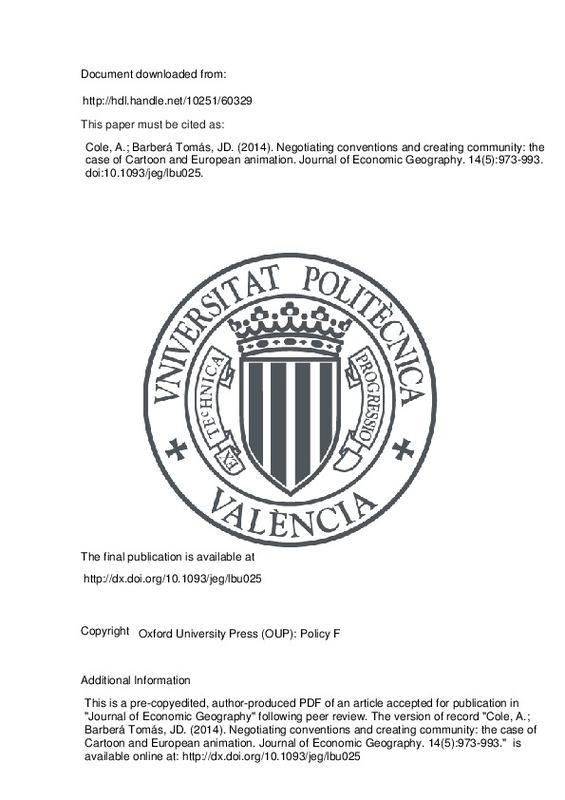Santisteban, M. A. (2006). Business Systems and Cluster Policies in the Basque Country and Catalonia (1990–2004). European Urban and Regional Studies, 13(1), 25-39. doi:10.1177/0969776406059227
Amin, A. (1999). An Institutionalist Perspective on Regional Economic Development. International Journal of Urban and Regional Research, 23(2), 365-378. doi:10.1111/1468-2427.00201
Amin, A., & Roberts, J. (2008). Knowing in action: Beyond communities of practice. Research Policy, 37(2), 353-369. doi:10.1016/j.respol.2007.11.003
[+]
Santisteban, M. A. (2006). Business Systems and Cluster Policies in the Basque Country and Catalonia (1990–2004). European Urban and Regional Studies, 13(1), 25-39. doi:10.1177/0969776406059227
Amin, A. (1999). An Institutionalist Perspective on Regional Economic Development. International Journal of Urban and Regional Research, 23(2), 365-378. doi:10.1111/1468-2427.00201
Amin, A., & Roberts, J. (2008). Knowing in action: Beyond communities of practice. Research Policy, 37(2), 353-369. doi:10.1016/j.respol.2007.11.003
Bathelt, H., Malmberg, A., & Maskell, P. (2004). Clusters and knowledge: local buzz, global pipelines and the process of knowledge creation. Progress in Human Geography, 28(1), 31-56. doi:10.1191/0309132504ph469oa
Bathelt, H., & Schuldt, N. (2010). International Trade Fairs and Global Buzz, Part I: Ecology of Global Buzz. European Planning Studies, 18(12), 1957-1974. doi:10.1080/09654313.2010.515815
Bathelt, H., & Glückler, J. (2013). Institutional change in economic geography. Progress in Human Geography, 38(3), 340-363. doi:10.1177/0309132513507823
Battilana, J., Leca, B., & Boxenbaum, E. (2009). 2 How Actors Change Institutions: Towards a Theory of Institutional Entrepreneurship. The Academy of Management Annals, 3(1), 65-107. doi:10.1080/19416520903053598
Brown, J. S., & Duguid, P. (1991). Organizational Learning and Communities-of-Practice: Toward a Unified View of Working, Learning, and Innovation. Organization Science, 2(1), 40-57. doi:10.1287/orsc.2.1.40
Coe, N. M., & Bunnell, T. G. (2003). «Spatializing» knowledge communities: towards a conceptualization of transnational innovation networks. Global Networks, 3(4), 437-456. doi:10.1111/1471-0374.00071
Cohen, M. D., March, J. G., & Olsen, J. P. (1972). A Garbage Can Model of Organizational Choice. Administrative Science Quarterly, 17(1), 1. doi:10.2307/2392088
Cowan, R. (2000). The explicit economics of knowledge codification and tacitness. Industrial and Corporate Change, 9(2), 211-253. doi:10.1093/icc/9.2.211
Etzion, D., & Ferraro, F. (2010). The Role of Analogy in the Institutionalization of Sustainability Reporting. Organization Science, 21(5), 1092-1107. doi:10.1287/orsc.1090.0494
Faulconbridge, J. R. (2006). Stretching tacit knowledge beyond a local fix? Global spaces of learning in advertising professional service firms. Journal of Economic Geography, 6(4), 517-540. doi:10.1093/jeg/lbi023
Faulconbridge, J. R. (2007). Exploring the Role of Professional Associations in Collective Learning in London and New York’s Advertising and Law Professional-Service-Firm Clusters. Environment and Planning A: Economy and Space, 39(4), 965-984. doi:10.1068/a38190
Faulconbridge, J. R. (2010). Global Architects: Learning and Innovation through Communities and Constellations of Practice. Environment and Planning A: Economy and Space, 42(12), 2842-2858. doi:10.1068/a4311
Gertler, M. S. (1995). «Being There»: Proximity, Organization, and Culture in the Development and Adoption of Advanced Manufacturing Technologies. Economic Geography, 71(1), 1. doi:10.2307/144433
Gomez, P.-Y., & Jones, B. C. (2000). Crossroads—Conventions: An Interpretation of Deep Structure in Organizations. Organization Science, 11(6), 696-708. doi:10.1287/orsc.11.6.696.12530
Grabher, G. (2002). Cool Projects, Boring Institutions: Temporary Collaboration in Social Context. Regional Studies, 36(3), 205-214. doi:10.1080/00343400220122025
Grandadam, D., Cohendet, P., & Simon, L. (2013). Places, Spaces and the Dynamics of Creativity: The Video Game Industry in Montreal. Regional Studies, 47(10), 1701-1714. doi:10.1080/00343404.2012.699191
Håkanson, L. (2005). Epistemic Communities and Cluster Dynamics: On the Role of Knowledge in Industrial Districts. Industry & Innovation, 12(4), 433-463. doi:10.1080/13662710500362047
Hakanson, L. (2010). The firm as an epistemic community: the knowledge-based view revisited. Industrial and Corporate Change, 19(6), 1801-1828. doi:10.1093/icc/dtq052
Hardy, C., & Maguire, S. (s. f.). Institutional Entrepreneurship. The SAGE Handbook of Organizational Institutionalism, 198-217. doi:10.4135/9781849200387.n8
Hildreth, P., Kimble, C., & Wright, P. (2000). Communities of practice in the distributed international environment. Journal of Knowledge Management, 4(1), 27-38. doi:10.1108/13673270010315920
Howells, J. (2006). Intermediation and the role of intermediaries in innovation. Research Policy, 35(5), 715-728. doi:10.1016/j.respol.2006.03.005
Lam, A. (1997). Embedded Firms, Embedded Knowledge: Problems of Collaboration and Knowledge Transfer in Global Cooperative Ventures. Organization Studies, 18(6), 973-996. doi:10.1177/017084069701800604
Lawrence, T. B., Hardy, C., & Phillips, N. (2002). INSTITUTIONAL EFFECTS OF INTERORGANIZATIONAL COLLABORATION: THE EMERGENCE OF PROTO-INSTITUTIONS. Academy of Management Journal, 45(1), 281-290. doi:10.2307/3069297
Lawrence, T. B., Suddaby, R., & Leca, B. (s. f.). Introduction: theorizing and studying institutional work. Institutional Work, 1-28. doi:10.1017/cbo9780511596605.001
Maguire, S., & Hardy, C. (2006). The Emergence of New Global Institutions: A Discursive Perspective. Organization Studies, 27(1), 7-29. doi:10.1177/0170840606061807
Maskell, P. (2001). Towards a Knowledge-based Theory of the Geographical Cluster. Industrial and Corporate Change, 10(4), 921-943. doi:10.1093/icc/10.4.921
Maskell, P., Bathelt, H., & Malmberg, A. (2006). Building global knowledge pipelines: The role of temporary clusters. European Planning Studies, 14(8), 997-1013. doi:10.1080/09654310600852332
Schuldt, N., & Bathelt, H. (2011). International Trade Fairs and Global Buzz. Part II: Practices of Global Buzz. European Planning Studies, 19(1), 1-22. doi:10.1080/09654313.2011.530390
Slager, R., Gond, J.-P., & Moon, J. (2012). Standardization as Institutional Work: The Regulatory Power of a Responsible Investment Standard. Organization Studies, 33(5-6), 763-790. doi:10.1177/0170840612443628
Takhteyev, Y. (2009). NETWORKS OF PRACTICE AS HETEROGENEOUS ACTOR-NETWORKS. Information, Communication & Society, 12(4), 566-583. doi:10.1080/13691180902859369
Torre, A., & Rallet, A. (2005). Proximity and Localization. Regional Studies, 39(1), 47-59. doi:10.1080/0034340052000320842
Yoon, H., & Malecki, E. J. (2009). Cartoon planet: worlds of production and global production networks in the animation industry. Industrial and Corporate Change, 19(1), 239-271. doi:10.1093/icc/dtp040
[-]







![[Cerrado]](/themes/UPV/images/candado.png)


